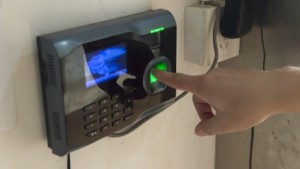
TOKYO — Projects are under way at Japanese universities to develop new personal authentication technologies using individuals’ habits and unconscious behaviors that are hard to be imitated, hoping to turn them into commercial use by 2020. Conventional methods use fingerprints, irides, and facial images to prevent personal fraud. Experts warn these security methods are still vulnerable to identity theft.
A research team led by Yuji Watanabe, an associate professor at Nagoya City University, is working on software designed to discern people’s identities from movements and the speed at which their fingers operate smartphones. The software also aims to capture particular habits when users touch handsets for the first time. The system is said to verify identification with an accuracy of more than 93%.
The university hopes to start joint development of the system with companies within a few years. A team led by Mutsumi Watanabe, a professor at Kagoshima University, is developing a system to recognize people’s identities through handwriting done in the air with fingers. This handwriting is said to be distinct from person to person. The technology is expected to be used at security gates in schools and offices.
A team led by professor Yoshinobu Kajikawa of Kansai University is studying a biometric authentication method that focuses on people’s lip motion. It can verify identities with 94% accuracy.
A gait recognition system, developed by professor Yasushi Yagi of Osaka University, will soon be put into practical use to trace suspicious individuals via security cameras.[…]
Source: nikkei.com
